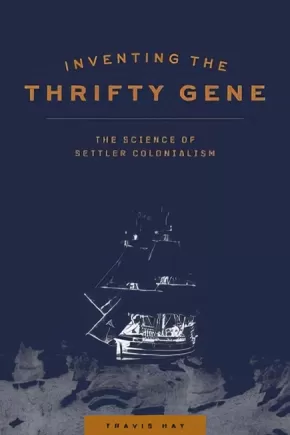Travis Hay
Travis Hay is a historian of Canadian settler colonialism who was born and raised in Thunder Bay, Ontario. He is currently an assistant professor at Mount Royal University, the author of Inventing the Thrifty Gene, and the English Language Book Review Editor of Canadian Journal of Health History.
Books (2)
Synopsis:
Though First Nations communities in Canada have historically lacked access to clean water, affordable food, and equitable health care, they have never lacked access to well-funded scientists seeking to study them. Inventing the Thrifty Gene examines the relationship between science and settler colonialism through the lens of “Aboriginal diabetes” and the thrifty gene hypothesis, which posits that Indigenous peoples are genetically predisposed to type 2 diabetes and obesity due to their alleged hunter-gatherer genes.
Hay’s study begins with Charles Darwin’s travels and his observations on the Indigenous peoples he encountered, setting the imperial context for Canadian histories of medicine and colonialism. It continues in the mid-twentieth century with a look at nutritional experimentation during the long career of Percy Moore, the medical director of Indian Affairs (1946–1965). Hay then turns to James Neel’s invention of the thrifty gene hypothesis in 1962 and Robert Hegele’s reinvention and application of the hypothesis to Sandy Lake First Nation in northern Ontario in the 1990s. Finally, Hay demonstrates the way in which settler colonial science was responded to and resisted by Indigenous leadership in Sandy Lake First Nation, who used monies from the thrifty gene study to fund wellness programs in their community.
Inventing the Thrifty Gene exposes the exploitative nature of settler science with Indigenous subjects, the flawed scientific theories stemming from faulty assumptions of Indigenous decline and disappearance, as well as the severe inequities in Canadian health care that persist even today.
Reviews
“Inventing the Thrifty Gene puts a much needed nail in the coffin of the ‘thrifty gene hypothesis’ by exposing its place within a long lineage of exploitative and extractive scientific research on Indigenous peoples.”– Ian Mosby, Department of History, Ryerson University
Educator Information
Afterword from Theresa Redsky Fiddler, who is an Anishinabe Elder originally from Big Grassy and Shoal Lake First Nation. She is an educator, an advocate, and an important figure in Nishnawbe Aski Nation’s Health Transformation initiative.
Table of Contents
Introduction: Underserviced and Over-Studied
Ch 1: On the Origins of Thrifty Genes: Charles Darwin and The H.M.S. Beagle
Ch 2: ‘The Operation of Being Civilized’: Sir Francis Bond Head the Foundations of Federal Indian Policy
Ch 3: Studied to Death: Chief Medical Officers and the Scientization of Federal Indian Policy
Ch 4: The Marrow Thief: James V. Neel and the Invention of the Thrifty Gene
Ch 5: Chief Josias Fiddler: Remembering the Hunger Strike of ’88
Ch 6: The Return of the Thrifty Gene: From the DNA Deal to Its Curious Afterlife
Conclusion: The Grandfather Rocks of Josias Fiddler
Afterword: Josias Fiddler’s Life and Legacy, by Teri Redsky Fiddler
208 pages | 6.00" x 9.00" | Paperback
Synopsis:
The manufacturing of a chronic food crisis.
Food insecurity in the North is one of Canada’s most shameful public health and human rights crises. In Plundering the North, Kristin Burnett and Travis Hay examine the disturbing mechanics behind the origins of this crisis: state and corporate intervention in northern Indigenous foodways.
Despite claims to the contrary by governments, the Hudson’s Bay Company (HBC), and the contemporary North West Company (NWC), the exorbitant cost of food in the North is neither a naturally occurring phenomenon nor the result of free-market forces. Rather, inflated food prices are the direct result of government policies and corporate monopolies. Using food as a lens to track the institutional presence of the Canadian state in the North, Burnett and Hay chart the social, economic, and political changes that have taken place in northern Ontario since the 1950s. They explore the roles of state food policy and the HBC and NWC in setting up, perpetuating, and profiting from food insecurity while undermining Indigenous food sovereignties and self-determination.
Plundering the North provides fresh insight into Canada’s settler colonial project by re-evaluating northern food policy and laying bare the governmental and corporate processes behind the chronic food insecurity experienced by northern Indigenous communities.
Reviews
“Spanning the late nineteenth century to the current day, Plundering the North provides meticulous detail about the ways in which HBC and NWC operated as agents of the state’s settler-colonial ambitions while the state subsidized the processes and profits of those private corporations. This is a valuable, unique, and timely contribution.”— Elaine Power
Additional Information
232 pages | 6.00" x 9.00" | Index, Bibliography | Paperback







